The 7 Best Canon EOS 20D Lenses
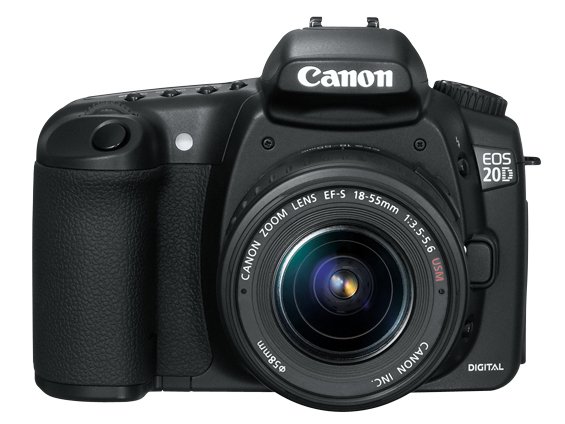
Here is a list of the 8 best lenses for the Canon EOS Rebel 20D. A wide selection of focal lengths for several types of photography are mentioned. Additionally, each choice will have additional options for lower or higher prices.
Every photographer will be able to get something they’d want in their camera bag.
Best Canon Rebel 20D Lenses:
Affiliate Advertising Disclosure
Outside the Shot is a participant in the Amazon Services LLC Associates Program, an affiliate advertising program designed to provide a means for sites to earn advertising fees by advertising and linking to Amazon.com.
As an eBay Partner, I may be compensated if you make a purchase. I also participate in affiliate advertising programs with KEH and Adorama. More can be found on the Affiliate Discolsure page.
- Best All-Around Zoom: Canon EF-S 17-55mm f/2.8 IS USM
- Best Telephoto Zoom: Sigma 18-300mm f/3.5-6.3 DC OS
- Best Prime Lens: Canon EF 50mm f/1.8 STM
- Best Lens for Portraits: Canon EF 85mm f/1.8 USM
- Best Lens for Sports & Wildlife: Tamron SP 150-600mm f/5-6.3 Di VC USD G2
- Best Lens for Landscapes: Canon EF 20mm f/2.8 USM
- Best Lens for Macro: Canon EF-S 60mm f/2.8 Macro USM
Types of Lenses
1. Standard Lenses
- Focal Length: Roughly between 40mm and 60mm, with 50mm being the most common.
- Characteristics: Provides a field of view similar to the naked eye, resulting in a natural-looking scene without distortion.
- Uses:
- Portraits
- Street Photography
- Indoor Photography
- Landscape Photography
2. Telephoto Lenses
- Focal Length: Above 60mm. Mid-range telephoto is around 70mm to 200mm, while super-telephoto is over 200mm.
- Characteristics: Magnifies subjects, allowing for capturing distant subjects.
- Uses:
- Portrait Photography (especially mid-range telephoto)
- Wildlife Photography
- Sports Photography
- Astronomy
3. Wide Angle Lenses
- Focal Length: Below 40mm. Lenses with a focal length less than 20mm are generally referred to as fisheye lenses.
- Characteristics: Captures a wider field of view, but may introduce distortion.
- Uses:
- Landscapes
- Interiors
- Large Group Photos
- Street Photography
- Architecture
4. Macro Lenses
- Characteristics: Designed for close-up photography with a 1:1 ratio, capturing subjects at life-size magnification.
- Uses:
- Nature Photography
- Insect Photography
- Portrait Photography
- Detail Photography (e.g., ring shots at weddings)
5. Prime Lenses
- Characteristics: Fixed focal length lenses (e.g., 35mm, 50mm, 85mm). They do not zoom and often provide sharper images and better overall image quality than zoom lenses.
- Advantages: Can shoot at lower apertures, allowing more light in and creating more background blur.
6. Zoom Lenses
- Characteristics: Allows changing through the focal range by turning the barrel. Can be variable or fixed aperture zoom lenses.
- Advantages: Provides multiple focal lengths in one lens, making them versatile for situations where you need to zoom in or out without changing the lens.
All-Around Best Zooms
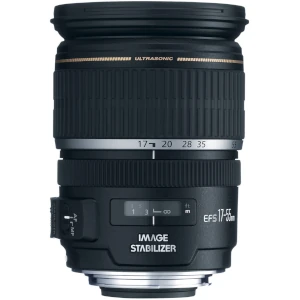
Canon EF-S 17-55mm f/2.8 IS USM: The quality of this lens is what you would expect from Canon’s full-frame L-series, but it is built for Cameras that have APS-C sensors that use the EF-S mount. It is a big improvement from the zoom sold as a kit with the EOS Rebel 20D.
The large maximum aperture is constant through the full zoom range allowing for a shallow depth of field and fantastic background blur. Camera shake is counteracted due to the built-in image stabilization.
If out of all Canon lenses available, you could only select one, this would be the best choice.
See current price and more information on:
Sigma 17-50mm f/2.8 EX DC OS HSM FLD: With image stabilization, tack sharp photos can be captured at shutter speeds up to 4 stops lower than if there was no stabilization. With the fast aperture and excellent zoom range, the lens is appropriate for everything from portraits to landscapes.
Judging by the outstanding customer reviews, users love this lens. It could end up being the go to choice for your camera.
See current price and more information on:
Canon EF-S 15-85mm f/3.5-5.6 IS USM: With an equivalent zoom range of 24-136mm in full frame format, it makes a terrific pick for general everyday use. It is additionally cited as one of the most useful selections for a travel lens.
See current price and more information on:
Best Telephoto Zooms
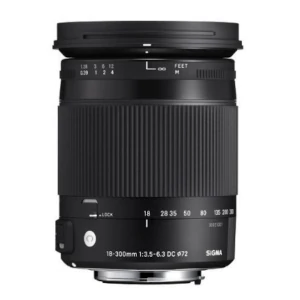
Sigma 18-300mm f/3.5-6.3 DC OS: This is like having a bunch of zoom lenses merged into one. The 16.6x zoom ratio means everything from telephoto to wide angle are covered. Built with 13 groups containing 17 elements, four of which are FLD and 1 SLD element, makes it possible to capture sharp crisp, high-quality images, without having to worry about aberrations.
The sizeable focal length span does come at the expense of being heavy and large. Other choices that can be better to dedicate all day lugging around in combination with the Canon EOS Rebel 20D.
See current price and more information on:
Canon EF-S 18-200mm f/3.5-5.6 IS: This serves as a compact and lightweight lens that is still equipped with a sizeable zoom range. This is a superb solution that has terrific performance, 4 stops of stabilization, all at an easily affordable price. This is a terrific choice to avoid unwanted size and weight.
See current price and more information on:
Canon EF 75-300mm f/4-5.6 III: Lighter weight and more compact than the other recommendations mentioned earlier, which can be an important consideration if you would rather not bring a hefty kit. The focal length is equivalent to 120-480mm on a Canon APS-C sensor.
Additionally, it’s quite competitively priced, stemming from the absence of built-in image stabilization. This is one of the lenses that is best to use outdoors with ample amounts of ambient light.
See current price and more information on:
Best Primes
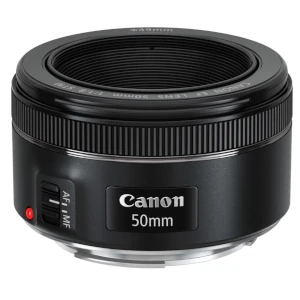
Canon EF 50mm f/1.8 STM: This is one of the best lenses produced by Canon as it provides outstanding picture quality, but still comes in a lightweight and compact build. The large f/1.8 aperture makes this timeless focal length the perfect selection for low light photography. An excellent lens for all photographers that can find a place in any kit.
Avoid buying the old version seeing as the motor that powers the focusing system is noisy and sluggish. You will probably not care for the outcome of wanting to save a small amount of money.
See current price and more information on:
Canon EF-S 24mm f/2.8 STM: Out of all the choices made for Canon’s EF-S mount, this is the slimmest and most compact. This wide angle lens is called a “pancake” because of the small size, making it a great pick for travel photography. It can take pictures as close as 6 inches (16 cm).
See current price and more information on:
Sigma 35mm F1.4 Art DG HSM: A really good example of what contemporary optical engineering is capable of. Shot wide open, images are razor sharp, from corner to corner. The hyper-sonic motor (HSM) enables accurate, quite, and fast autofocus.
See current price and more information on:
Best Portrait Photography Lenses
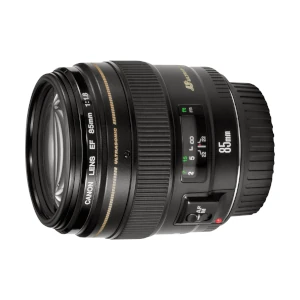
Canon EF 85mm f/1.8 USM: One of, if not, the most widely used lens for portrait photography offered by Canon. The large f/1.8 aperture is an excellent option for low light shooting and can be used to produce a shallow depth of field, with beautiful bokeh, to isolate the subject of the photo. For wedding photographers, this is a important lens to purchase.
See current price and more information on:
Sigma 50mm F1.4 Art DG HSM: A great lens that is suitable for portrait photography along with studio work, street, and landscape, with a professional level construction quality. There is virtually no distortion or vignetting and it’s amazingly sharp from corner to corner, even shot wide open.
See current price and more information on:
Canon EF 100mm f/2 USM: Very close to the Canon 85mm f/1.8, but provides a slightly narrower field of view. Like the other two lenses mentioned, it is really good for low-light photography in a streamlined package that’s easy to use.
Manufacture of this lens has stopped, so finding one in stock could be difficult. Many pre-owned copies are still for sale. Check several sites to find the most competitive price.
See current price and more information on:
Best Sports & Wildlife Lenses
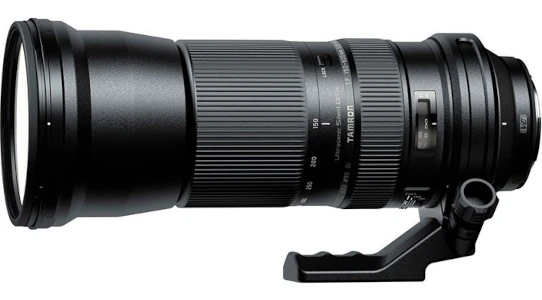
Tamron SP 150-600mm f/5-6.3 Di VC USD G2: The G2 is the 2nd gen version of this lens and is a big advancement by Tamron. Image quality has improved across the whole zoom range and still having a great construction quality. An ultrasonic silent drive motor drives the autofocus which is amazingly precise and fast. With this on your camera, you will find you have no trouble capturing awesome wildlife or action photos.
See current price and more information on:
Sigma 150-600mm f/5-6.3 Contemporary DG OS HSM: The Sigma features a portable and lightweight build for a hyper-telephoto zoom lens. Additionally, the optical stabilizer and hyper sonic motor, there is an accelerometer in order to improve photographs when panning. As a added perka , there is quite often a promo offer that bundles additional items plus free shipping if you buy the lens. That’s good as free camera gear is difficult to pass up.
See current price and more information on:
Canon EF 100-400mm F4.5-5.6L IS II USM: This is no doubt, the lens has much better picture performance than the other two. With that in mind, high performance is attached to a substantial price tag that is significantly bigger than that of the camera. One of the many excellent features of this lens is a rotation-type zoom ring which includes adjustable torque control allowing the lens to be customized to personal liking.
See current price and more information on:
Best Lenses for Landscape Photography
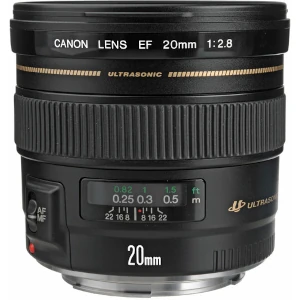
Canon EF 20mm f/2.8 USM: This is a wide angle that is small and lightweight, weighing only 405g (14.3 oz). There is a manual focus override, even when set to AF, that allows for perfect focus to be obtained. If you plan on going on hikes with your Rebel 20D, this is an outstanding choice as it will be able to fit into just about any camera bag.
See current price and more information on:
Samyang 14mm f/2.8 IF ED UMC: Offering a built-in petal-type hood, this ultra-wide lens is a low cost alternative. A fantastic choice for not just solely landscape photography but as well as for real estate and astrophotography. Pictures can be captured as close as 10.8 inches (14 cm), but the results will have very noticeable distortion.
See current price and more information on:
Sigma 20mm f/1.4 DG HSM Art: The widest lens in the Sigma Art series lineup, the 20mm f/1.4 provides a truly professional construction. Featuring 11 groups having 15 elements with a 5 Special Low Disperson and a Low Dispersion element, axial chromatic aberration, field curvature, and spherical aberration are effectively gone.
It is a noticeably heavy and big hunk of glass. You shouldn’t anticipate the lens to be well balanced mounted on the camera.
See current price and more information on:
Best Canon Macro Lenses
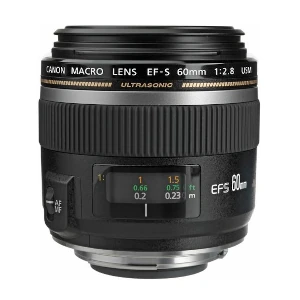
Canon EF-S 60mm f/2.8 Macro USM: The first to be specifically designed by Canon for the EF-S mount, it is a real macro lens, able to achieve 1:1 magnification. It was designed with internal focusing, which means the front element will not move. You are going to appreciate the sharp images created by this lens. It is a terrific pick to use on the EOS Rebel 20D because of the small size and value being difficult to outdo.
See current price and more information on:
Canon EF 100mm f/2.8L Macro IS USM: With internal focusing and optical stabilization, it is obvious why this is a top of the line pro L-series lens. It’s weather sealed, and that means it is a terrific pick to take out into the field in difficult conditions. Buy this lens and you’ll never need to go looking for an alternative.
See current price and more information on:
Tamron AF 90mm f/2.8 Di SP A/M 1:1 Macro: With recessed front element and an excellent working distance, you will most likely never need to make use of the hood. Having said that, it doesn’t have an internal focusing system, therefore the lens will extend when focusing.
A further potential disadvantage if you would like to use it as a portrait lens is that it doesn’t have built-in image stabilization. However, if you use a flash that won’t be a concern.
See current price and more information on:
Canon EF Lens Terminology
-
ASC (Air Sphere Coating): Introduced in 2014 with the 100-400mm f/4.5-5.6 L IS II, ASC reduces ghosting and flare in backlit situations. This lettering might not appear on the lenses themselves but will appear on the box or packaging of the lens.
-
BR (Blue Spectrum Refractive): BR signifies a newer type of organic lens element. This element works to reduce chromatic aberration by correcting the blue and purple wavelengths. Currently, the 35mm f/1.4 L II is the only Canon lens with this BR element.
-
SA Control: This term was not mentioned in the provided content.
-
DS (Defocus Smoothing): DS made its first appearance in 2019 on the RF 85mm f/1.2 DS. It is Canon’s version of a lens with a built-in apodization filter – a circular graduated neutral filter located behind the lens elements. It helps to smooth out out-of-focus areas in an image, particularly bokeh balls.
-
IS (Image Stabilization): Canon’s acronym for optical image stabilization. This technology stabilizes a hand-held camera using gyros that counteract minute movements of the camera. By moving some of the lens’ optical elements, this technology counters shakes and provides sharper results when a slower shutter speed is used for a static subject.
-
USM (UltraSonic Motor): An indicator of a lens being equipped with Canon’s top-of-the-line focusing motor. USM is used in most of the latest Canon lenses. This motor allows for powerful, fast, and quiet autofocus and permits full-time manual focus override.
-
Micro USM: A smaller and cheaper version of the USM design meant for low-end lenses and kit zoom lenses. It is noisier than USM and, with the exception of the 50mm f/1.4, does not allow for a manual focus override.
-
DC (Direct Connect): A DC geared motor is a feature of some of the older or more affordable lenses that Canon offers. Lenses with a DC motor tend to be slower to focus and noisier than USM or Micro USM models. They also do not offer a full-time manual focusing feature.
-
STM (Stepper Motor): A motor that allows for a smoother and quieter focus by minimizing the autofocus vibrations and noise during video recording. STM lenses use a focus-by-wire system, meaning the focus ring controls a motor, which then moves the internal lens elements.
-
I, II, III: These roman numeral markings on lenses signify the lens’ generation. They represent the upgraded version or the revision number. For instance, a lens marked III is newer than one marked II.
-
SC & SSC (Spectra Coating & Super Spectra Coating): Acronyms for coatings applied to optical lens elements to increase contrast and decrease flare and reflections. While SC was used for cheaper lenses, SSC was meant for the more expensive ones. As modern lenses are coated with complex multi-coats, SSC is no longer in use.
-
SWC: This term was not mentioned in the provided content.
-
AFD (Arc-From Drive): Canon’s very first autofocus motor technology, which is no longer in use. The lenses were noisier and slower to focus than other lenses and had no manual override.
-
MM (Micro Motor): Developed to create less expensive versions of the AFD motor. It turned out to be the least advanced AF motor in use, being even slower and noisier than the AFD motor. It does not permit full-time manual focus override.
-
KAS S: This term was not mentioned in the provided content.
-
VR: This term was not mentioned in the provided content.
Related Posts
Here is a list of posts related to the Canon Rebel 20D camera: